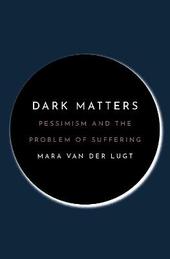
|
Dark Matters: Pessimism and the Problem of Suffering
Hardback
Main Details
| Title |
Dark Matters: Pessimism and the Problem of Suffering
|
| Authors and Contributors |
By (author) Mara van der Lugt
|
| Physical Properties |
| Format:Hardback | | Pages:472 | | Dimensions(mm): Height 235,Width 156 |
|
| Category/Genre | Ethics and moral philosophy
Social and political philosophy |
|---|
| ISBN/Barcode |
9780691206622
|
| Classifications | Dewey:170 |
|---|
| Audience | |
|---|
|
Publishing Details |
| Publisher |
Princeton University Press
|
| Imprint |
Princeton University Press
|
| Publication Date |
21 September 2021 |
| Publication Country |
United States
|
Description
An intellectual history of the philosophers who grappled with the problem of evil, and the case for why pessimism still holds moral value for us today. In the seventeenth and eighteenth centuries, philosophers engaged in heated debates on the question of how God could have allowed evil and suffering in a creation that is supposedly good. Dark Matters traces how the competing philosophical traditions of optimism and pessimism arose from early modern debates about the problem of evil, and makes a compelling case for the rediscovery of pessimism as a source for compassion, consolation, and perhaps even hope. Bringing to life one of most vibrant eras in the history of philosophy, Mara van der Lugt discusses legendary figures such as Leibniz, Hume, Voltaire, Rousseau, Kant, and Schopenhauer. She also introduces readers to less familiar names, such as Bayle, King, La Mettrie, and Maupertuis. Van der Lugt describes how the earliest optimists and pessimists were deeply concerned with finding an answer to the question of the value of existence that does justice to the reality of human suffering, but how they were fundamentally divided over what such an answer should look like. A breathtaking work of intellectual history by one of today's leading scholars, Dark Matters reveals how the crucial moral aim of pessimism is to find a way of speaking about suffering that offers consolation and does justice to the fragility of life. 'Dark Matters is history of philosophy at its best - scholarly, argumentative, and lively. Van der Lugt traces the ways in which the problem of theodicy - of justifying the works of God in a world full of evil - was transformed across the eighteenth century into the choice between optimism and pessimism, understood not as psychological expectations of the future but as philosophical alternatives in the face of suffering.' - John Robertson, University of Cambridge 'This beautifully written and carefully argued book deploys a hermeneutics of sympathy for those philosophers who wonder whether life is worth living at all. The effects are a kind of alchemy: while one contemplates the most awful thoughts, van der Lugt's expert and gentle guidance creates the joy that comes from knowing one is not wholly alone in the world.' - Eric Schliesser, University of Amsterdam
Author Biography
Mara van der Lugt is lecturer in philosophy at the University of St Andrews, where she specializes in early modern intellectual history and philosophy. She is the author of Bayle, Jurieu, and the "Dictionnaire Historique et Critique."
Reviews"A Times Literary Supplement Book of the Year 2021" "Honorable Mention for the Journal of the History of Philosophy Book Prize" "Van der Lugt succeeds brilliantly in her aim of setting aside the arid technical disputes in which philosophy often seems (at least to the layman) to be enmeshed, and applying it with compelling urgency to perennial and fundamental moral questions."---Ritchie Robertson, Times Literary Supplement "This is a highly readable, elegantly written and sophisticated study that even non-philosophers will find accessible and illuminating, and perhaps also inspiring."---Steven Nadler, Literary Review "Engaged and engaging."---Julian Young, Society "Reading this book is a rare event and something of an adventure in that it is as solidly argued as it is eloquent and as learned as it is moving. Those who feel philosophers no longer care to address truly vital issues are especially in for a treat."---Wiep van Bunge, British Journal for the History of Philosophy "[Van der Lugt] handles these 'dark matters'-evil, suffering, suicide-with admirable delicacy. As such her book is an invaluable source for anyone interested in the history of human thinking about evil and suffering, hope and consolation."---Maikki Aakko, Heythrop Journal
|